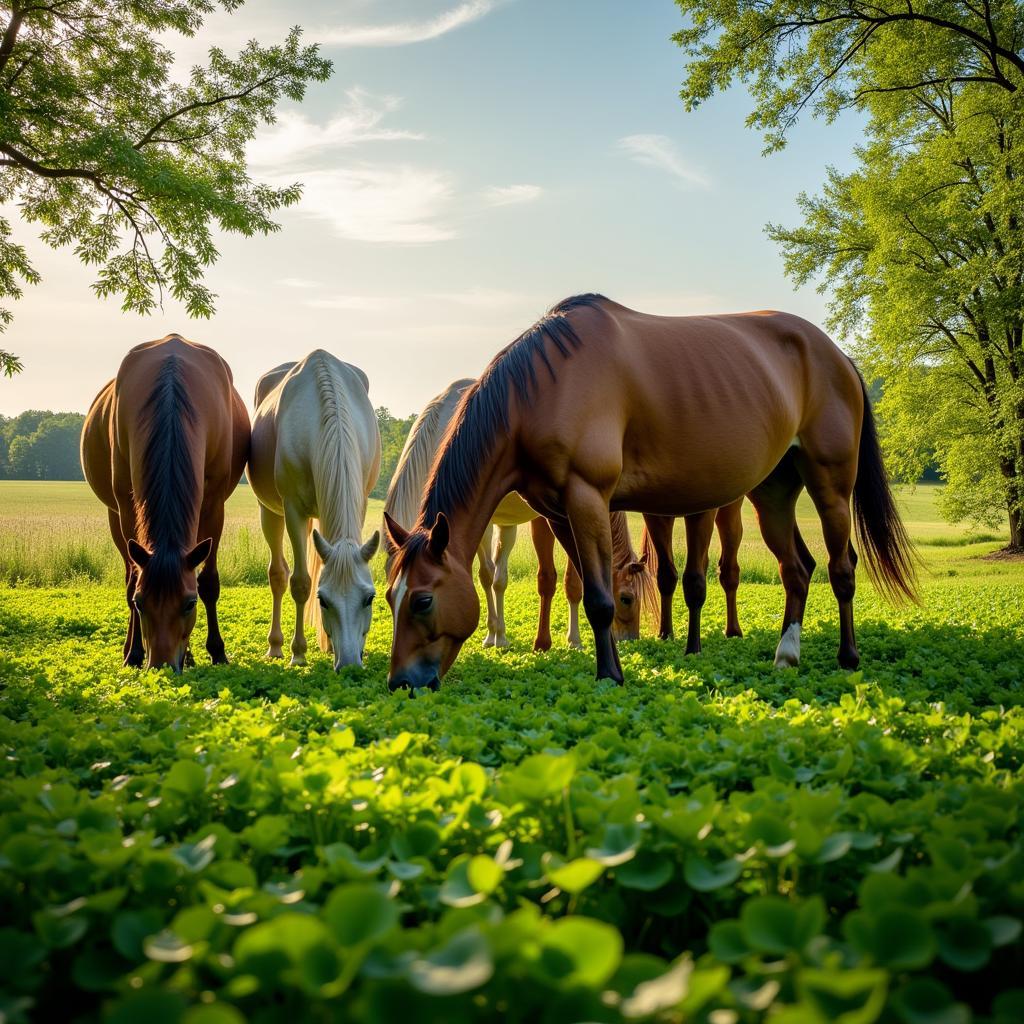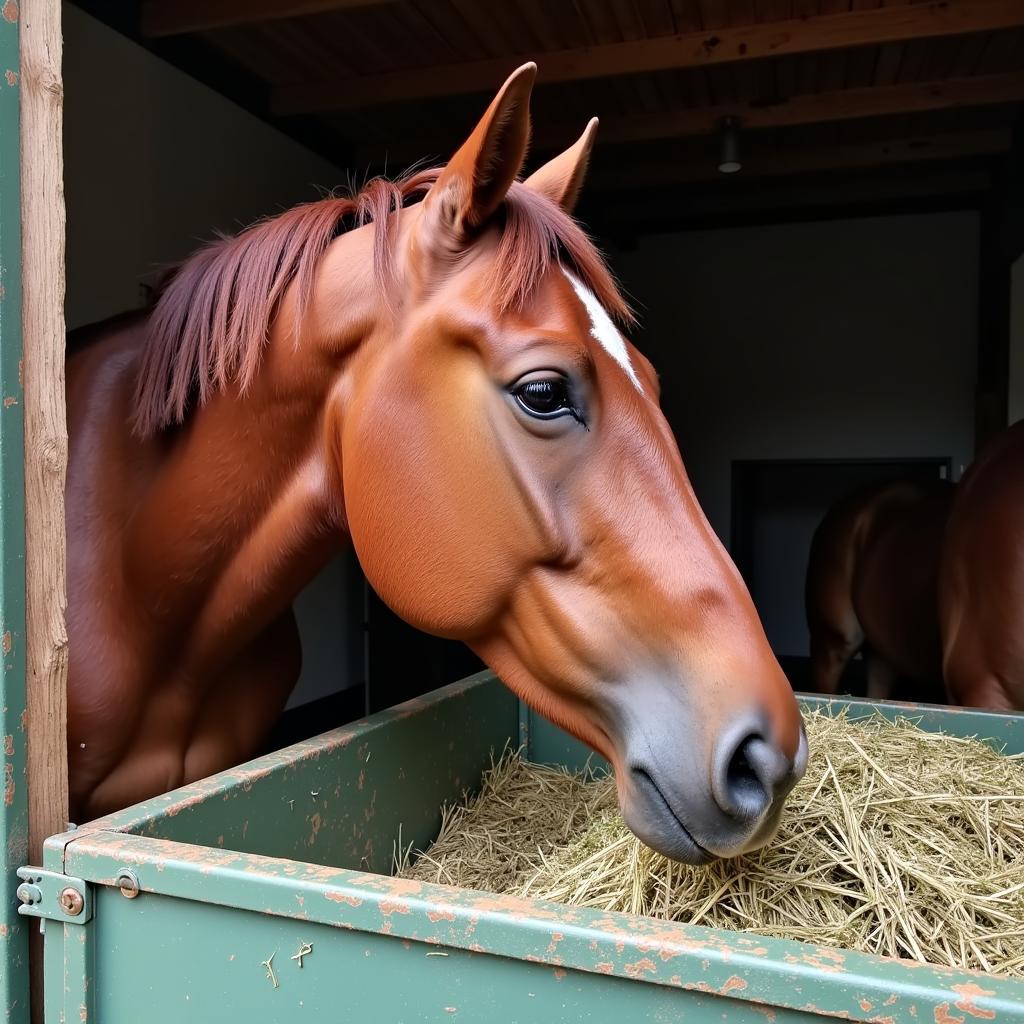Is Clover Bad For Horses? This is a common question among horse owners, and the answer is more nuanced than a simple yes or no. While clover can be a nutritious part of a horse’s diet, certain types and conditions can pose risks to their health. Let’s delve into the complexities of clover and its impact on horses.
 Horses Grazing in a Clover Field
Horses Grazing in a Clover Field
Understanding the Different Types of Clover
There are various types of clover, and some are more beneficial than others. White clover, for instance, is a common legume found in pastures and is generally considered safe for horses in moderation. It’s rich in protein and can contribute to a healthy diet. However, too much white clover can lead to issues like slobbers, a condition caused by a fungus that grows on the clover.
Red clover, on the other hand, while also protein-rich, can be more problematic. It contains coumarin, a naturally occurring anticoagulant that can interfere with blood clotting. While small amounts are usually harmless, large quantities of red clover can increase the risk of bleeding.
The Potential Dangers of Clover for Horses
As mentioned, the primary concern with clover is the presence of certain fungi and compounds that can negatively affect horse health. One such fungus produces slaframine, the culprit behind the aforementioned “slobbers.” This condition, characterized by excessive salivation, is usually more of a nuisance than a serious health threat. However, in severe cases, it can lead to dehydration.
Another concern, particularly with red clover, is the risk of photosensitization. This occurs when certain compounds in the plant react with sunlight, causing skin irritation and inflammation, especially in white or light-colored horses.
Managing Clover in Your Horse’s Pasture
So, how can you manage clover in your pasture to minimize the risks and maximize the benefits? Regular pasture management is crucial. This includes mowing to prevent clover from becoming overgrown and encouraging a diverse mix of grasses and legumes. Rotating pastures can also help reduce the risk of overexposure to any one plant, including clover.
Is Alsike Clover Poisonous to Horses?
Alsike clover presents a more serious threat to horses. It contains both slaframine, which causes slobbers, and canavanine, a toxic amino acid that can lead to liver damage and photosensitization, making it particularly dangerous. It’s essential to identify and eliminate alsike clover from your horse’s pasture.
“Alsike clover is a hidden danger in many pastures,” says equine nutritionist Dr. Amelia Carter. “Its toxicity can have devastating effects on horses, so it’s crucial for owners to be vigilant in identifying and removing it.”
Can Horses Eat Clover Hay?
Clover hay, like pasture clover, can be a part of a horse’s diet, but the same precautions apply. Ensure the hay is properly cured and free of mold and mildew. It’s best to avoid hay containing a high percentage of red clover, especially if your horse is prone to bleeding disorders.
“While clover hay can be a nutritious feed source,” explains Dr. David Miller, an equine veterinarian with over 20 years of experience, “it’s crucial to know the type of clover present and monitor your horse for any adverse reactions.”
 Horse Eating Hay in a Stable
Horse Eating Hay in a Stable
Conclusion: Clover and Horses – A Balanced Approach
In conclusion, is clover bad for horses? Not necessarily. While certain types and conditions can be harmful, clover can be a nutritious part of a horse’s diet in moderation. Careful pasture management, understanding the different types of clover, and monitoring your horse’s health are key to ensuring they benefit from clover without experiencing its potential downsides.
FAQs
- What are the signs of slobbers in horses? Excessive drooling is the most obvious sign.
- How can I prevent slobbers in my horses? Manage your pasture to minimize clover overgrowth.
- Can horses recover from slobbers? Yes, usually once they are removed from the source of the fungus.
- Is all clover bad for horses? No, white clover in moderation is generally safe.
- What should I do if I suspect my horse has eaten toxic clover? Contact your veterinarian immediately.
- Can I feed my horse clover treats? It’s best to avoid them, as they may contain high concentrations of potentially harmful compounds.
- How do I identify different types of clover? Consult a local agricultural extension or a pasture management specialist.
Need more help? Contact us! Phone: 0772127271, Email: [email protected]. Visit us at QGM2+WX2, Vị Trung, Vị Thuỷ, Hậu Giang, Việt Nam. We offer 24/7 customer support.